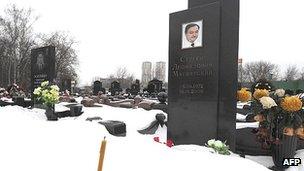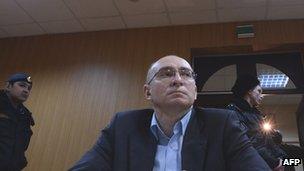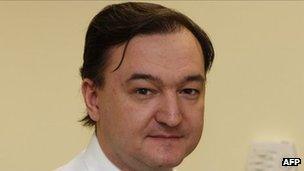Magnitsky trial: Russia accused of 'travesty' over dead lawyer
- Published

Sergei Magnitsky's death triggered an outcry from human rights activists
"Absurd" and "a travesty" are some of the words used to describe Russia's trial of the dead lawyer Sergei Magnitsky, set to open on 22 March.
The European Parliament says the trial "is a violation of international and national laws and clearly shows the malfunctioning of the Russian criminal justice system".
The Russian interior ministry has accused Mr Magnitsky and the UK-based fund manager who employed him, Bill Browder, of tax evasion. Mr Browder will also be tried - but in absentia, because he believes his life would be in danger were he to return to Russia.
According to a ministry official, Boris Kibis, the Magnitsky case remains open because there has been no request from his relatives to halt it.
Legal experts contacted by the BBC said they could find no parallels for the Magnitsky trial - whether in Russia or internationally. They say there are dubious legal grounds for such a case.
Medieval show trial
There is a grisly medieval precedent for putting a dead man on trial - in 897 the then Pope, Stephen VII, held a trial of his predecessor, Formosus, whose body was dug up and propped up on a chair in the papal court.
US law professor Donald Wilkes, of the University of Georgia, has written that Stephen VII "screamed and raved, hurling insults at and mocking the rotting corpse" at what was dubbed "the Cadaver Synod".
Formosus was found guilty of violating Church law, but the macabre trial caused widespread anger in Rome and within months Pope Stephen VII was overthrown.

Prison doctor Dmitry Kratov was cleared of negligence in December
Under Russian law the death of the accused means the investigation ought to be stopped, retired Russian judge Tamara Morshchakova told the BBC's Daniel Sandford in Moscow. She formerly served in Russia's Constitutional Court.
Mr Magnitsky's death in prison while on remand in 2009 has become a cause celebre among critics of abuse in the Russian justice system.
Acting on behalf of Hermitage Capital Management, he had exposed an alleged fraud in which government officials had stolen $230m (£150m) of tax revenue.
But instead of prosecuting any of the alleged embezzlers, the police arrested Mr Magnitsky.
In prison his pancreatitis went untreated and an investigation by the Russian Presidential Human Rights Council concluded that he was a victim of criminal negligence. There is evidence that a beating by prison guards may have killed the chronically ill prisoner, the council reported. His relatives said his body was bruised and finger bones had been broken.
The council also condemned the fact that the same interior ministry officials whom Mr Magnitsky had accused of tax fraud were the ones who handled his arrest and prosecution.
International impact
The Magnitsky case has soured Russian-US relations and the European Parliament has urged EU governments to emulate the US Magnitsky Act, which bars entry for Russian officials suspected of human rights violations. Officials on the blacklist can also have their foreign assets frozen under the act.
Nobody has been convicted over the lawyer's death or the alleged theft from state coffers. A prison doctor was acquitted in December, after being accused of negligence.

Sergei Magnitsky was 37 when he died after a year in detention
Ms Morshchakova said the posthumous trial of Mr Magnitsky was "very strange" and "dangerous".
"If such trials were possible then in Russian judicial practice there would be a lot of 'dead souls' in the role of the accused," she said.
The exploitation of dead people for personal profit is the theme of Dead Souls, a 19th-Century Russian classic by Nikolai Gogol. The grotesque comedy features a social climber who buys dead serfs from the nobles who owned them.
"The authorities must halt this travesty," Amnesty International said in January.
"The trial of a deceased person and the forcible involvement of his relatives is a dangerous precedent that would open a whole new chapter in Russia's worsening human rights record," Amnesty's Europe and Central Asia Director John Dalhuisen said.
Mr Magnitsky's widow and mother oppose the trial - but the state has appointed defence lawyers anyway to represent Mr Magnitsky and Mr Browder.
Prof Mike Redmayne, a criminal law expert at the London School of Economics (LSE), told BBC News that "trying a dead person would make as much sense as trying a horse".
He said there was usually no point trying dead people because trials are about punishment and involve a process of interaction with the accused, including the accused's ability to defend him- or herself. "It is possible to have a trial in absentia if the defendant disappears, but we rarely do this," he said.
'Creative' legal moves
Ella Paneyakh, a sociologist and legal expert at Russia's European University in St Petersburg, said the case illustrated how in President Vladimir Putin's Russia "they are getting very creative, interpreting the law very literally, in a way which does not correspond to the spirit of the law".
"One thing this case says is that there is no real rule of law in Russia, at least in such political issues," she told BBC News.
The "unprecedented" trial of a dead man, she said, shows that "so much political capital is already invested in this case, and they need some legal back-up".
"Many lawyers are looking at this case now, and if someone knew of a similar case [previously] it would appear on social networks - but it hasn't," she said.
Russian law does allow relatives to get a dead person rehabilitated, to restore their reputation - a practice that was common in the post-Stalin thaw under Nikita Khrushchev, to clear the names of people executed or exiled by the Communist Party as "traitors" or "saboteurs".
The posthumous rehabilitation process allowed old cases to be re-examined, but did not lead to new prosecutions, Ms Paneyakh said. That was frustrating for some Soviet-era dissidents who wanted punishment for those who had sentenced them.
The UK has also reopened some historic cases involving dead people, where there are suspected miscarriages of justice - but that did not mean putting a dead person on trial.
- Published11 July 2013
- Published7 December 2012
- Published6 March 2012